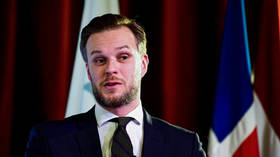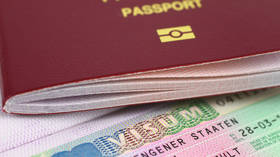Lithuania wants EU visa ban for Russian opposition

A blanket Schengen visa ban for Russian citizens would allow more people who disapprove of the government to be kept in the country, Lithuanian Foreign Minister Gabrielius Landsbergis said on Saturday. These people would thus become a driving force of political change, he believes.
In an interview with Deutsche Welle, the minister talked about what he sees as an unfair situation when Ukrainians are fleeing their country or fighting for their homes, while Russians can still enjoy traveling to the bloc.
When asked if he would like to see a Schengen visa ban applied to those Russians who are against the military action in Ukraine and who might be facing persecution in their own country, Landsbergis said that he believes that “change comes from within.” Therefore, he argued, the scenario of ‘two Russias,’ one of which would be in emigration, is not vital. He stressed that even if only 5-10% people in Russia oppose the country's actions in Ukraine, that would still mean millions of people. The real change – the establishment of “democratic Russia” – will be prompted by those people, and thus it is better if they stay in their home country, the minister said.
Landsbergis argued that the EU could impose a total ban on visas for Russian citizens, except for those who apply on humanitarian grounds. He said that his country, by working with various non-government organizations, has already found a good way to establish when humanitarian grounds are valid.
The three Baltic countries – Lithuania, Estonia and Latvia – have been known for their harsh policies towards Russia and were among the first nations to impose visa restrictions on Russian citizens in response to Moscow’s military operation in Ukraine. They are now at the forefront of the call for an EU-wide visa ban.
Germany and many EU officials, however, have been skeptical of the idea. German Chancellor Olaf Scholz cited the “very far-reaching sanctions” imposed on Russia and said that a visa ban would weaken their effectiveness “if it was directed against everyone, including innocent people.”
A spokeswoman for the European Commission said that a total ban would simply be unlawful and that each application must be considered individually.
Kremlin spokesman Dmitry Peskov, commenting in July on the Schengen visa ban proposals, said that Moscow hopes that the EU would show common sense. However, he didn’t rule out “actions of an emotional nature.”













